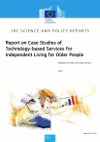 This report on case studies of technology-based services for independent living for older people is the second deliverable of the project entitled "Long-term care strategies for independent living of elderly people (ICT-AGE)". The Institute for Prospective Technological Studies (JRC-IPTS) was commissioned by DG Employment, Social Affairs and Inclusion (DG EMPL) of the European Commission to carry out this study under an Administrative Arrangement. The project focuses on one of the actions of the Commission's Social Investment Package (SIP) (2013a), which aims to help the Member States to implement the Country-specific Recommendations of the European Semester for more effective long-term care policies.
This report on case studies of technology-based services for independent living for older people is the second deliverable of the project entitled "Long-term care strategies for independent living of elderly people (ICT-AGE)". The Institute for Prospective Technological Studies (JRC-IPTS) was commissioned by DG Employment, Social Affairs and Inclusion (DG EMPL) of the European Commission to carry out this study under an Administrative Arrangement. The project focuses on one of the actions of the Commission's Social Investment Package (SIP) (2013a), which aims to help the Member States to implement the Country-specific Recommendations of the European Semester for more effective long-term care policies.
This research aims to help DG EMPL guide Member States in the development of long-term care strategies, which use technology-based services to enable older adults to continue living at home independently. These services use any kind of technology including Information and Communication Technologies (ICT) to empower clients to manage despite their frailties (self-sufficiency). They also make it possible to organize the provision of care better and increase the productivity and quality of long-term care delivery (capital substitution for care manpower). The project is being carried out by the research team on ICT for Employability and Inclusion of the Information Society Unit. The project started in May 2013 and ended in December 2014.
Download: Report on Case Studies of Technology-based Services for Independent Living for Older People (.pdf, 2.533 KB).
Download from eHealthNews.eu: Report on Case Studies of Technology-based Services for Independent Living for Older People (.pdf, 2.533 KB).